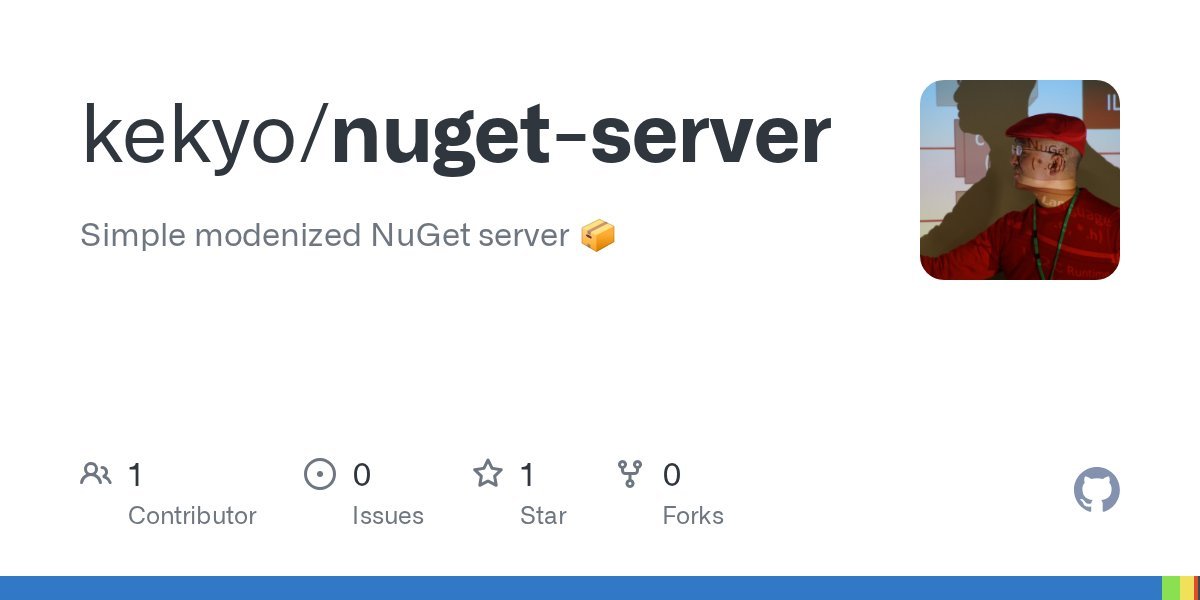Discover nuget-server, a streamlined Node.js implementation of the NuGet v3 protocol that enables developers to deploy private package repositories in seconds. With Docker support, zero-database architecture, and granular authentication controls, it simplifies secure package management for teams.

For .NET developers managing internal libraries, proprietary components, or CI/CD artifacts, maintaining a private NuGet repository is essential—yet traditional solutions often demand complex infrastructure. Enter nuget-server: A minimalist, open-source NuGet v3 server built on Node.js that strips away complexity while delivering enterprise-grade features.
Why This Solves Real Workflow Pain Points
Unlike heavyweight alternatives requiring databases or commercial licenses, nuget-server leverages the filesystem for storage—eliminating database management while ensuring straightforward backups via simple archiving. Its standout features address critical gaps in the OSS ecosystem:
# Start a fully functional server in 10 seconds
npm install -g nuget-server
nuget-server --port 3000
- Zero-Config V3 Protocol Compliance: Seamlessly integrates with
dotnet restore, Visual Studio, and NuGet CLI via/v3/index.jsonendpoint - Filesystem-First Storage: Packages stored in hierarchical directories (e.g.,
packages/MyLib/1.0.0/MyLib.nupkg), enabling atomic operations and direct filesystem backups - Granular Authentication: Modes range from open access (
none) to publish-only (publish) or fully locked (full), with zxcvbn-powered password strength enforcement - API Key Separation: Distinct UI passwords from machine-readable API keys for secure CI/CD integration
Docker-Optimized Deployment
{{IMAGE:5}}
Pre-built multi-architecture images (linux/amd64, linux/arm64) simplify cloud-native deployments. Permission-aware volume mounts ensure security:
# docker-compose.yml
docker run -d -p 5963:5963 \
-v ./data:/data \
-v ./packages:/packages \
kekyo/nuget-server:latest
Critical for production: The container runs as non-root user (UID 1001), requiring explicit directory permissions to avoid "500 Permission Denied" errors during publishes.
Enterprise-Grade Extras
- Reverse Proxy Ready: Configurable
baseUrlandtrustedProxiessupport load-balanced, TLS-terminated deployments - Package Migration Tool: CLI-based importer transfers entire repositories from external sources (supports authenticated sources)
- Admin Web UI: Browser interface for user management, API key rotation, and bulk .nupkg uploads via drag-and-drop
Authentication Deep Dive
 Security-conscious teams can enforce policies via
Security-conscious teams can enforce policies via config.json:
{
"authMode": "publish",
"passwordMinScore": 3, // Requires "Strong" passwords
"sessionSecret": "$(openssl rand -base64 32)"
}
Initial admin setup uses CLI interactivity or environment variables for automation:
export NUGET_SERVER_ADMIN_PASSWORD="$SECURE_PWD"
nuget-server --auth-init --config-file ./config.json
When to Choose NuGet-Server
This solution shines for:
- Small/mid-size teams needing ephemeral testing repositories
- Air-gapped environments requiring offline package sources
- CI/CD pipelines demanding lightweight, scriptable package hosting
- Projects avoiding cloud vendor lock-in
Though not designed for massive-scale package hosting (lacking advanced search or sharding), its simplicity fills a crucial niche. By reducing infrastructure overhead, it empowers developers to focus on shipping code—not managing package infrastructure.
Source: GitHub Repository

Comments
Please log in or register to join the discussion